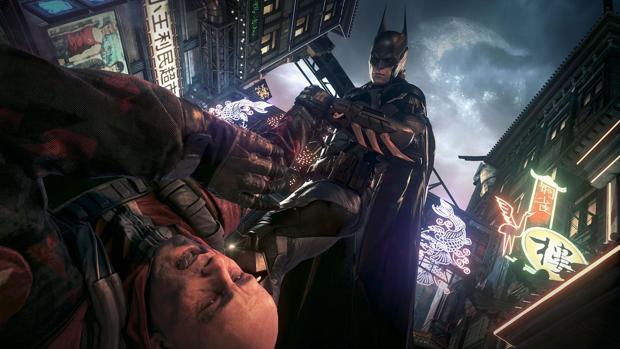
It was September 2009. I had just finished my second playthrough of "Batman: Arkham Asylum," which began roughly five seconds after the end of my first. I didn't just dive back into Rocksteady Studios' modern-day Metroidvania because the game was that good and I wanted more, I did it because I couldn't believe it was that good and I wanted to be sure.
Now, I was sure. After that second go-round stalking oily skinned brutes from the shadows and beating them up with the fight IQ of a clairvoyant Bruce Lee, I was definitely sure: "Arkham Asylum" was that good. It was great. It was a Bat-miracle.
One of my friends wasn't so sure, though. His objection was simple: "If it wasn't Batman, it'd be just another action game."
He had a point. But he also seemed to miss that of "Arkham Asylum": It wasn't designed to be an action game. It was designed to be a Batman simulator. Its stealth was designed to be powerful and predatory, its combat to be perfectionist. And yet, by arranging the forces of the Joker and other classic Bat-villains in increasingly zappy and stabby waves, it still felt like a superhero feat.
"Arkham Asylum" worked because it was Batman, and its Batman worked because of "Arkham Asylum."
Fast-forward six years to the release of "Arkham Knight," the fourth game in the series commissioned by Warner Bros., the third made by Rocksteady and the first to feature the Batmobile. It's the biggest "Arkham" game yet, the best-looking, the most blustery.
But it's not Batman.
Or rather, its Batman is broken — and it's the Batmobile's fault.
By introducing a model of Batman's car even more armor-plated and heat-packing than that of Christopher Nolan's films — and plenty of high-speed chases, tank warfare and Riddler racetracks to pave its way — "Arkham Knight" fumbles what made its predecessors fun. It doesn't feel like being Batman anymore.
It's not for lack of trying. "Knight's" Batman retains the militaristic worldview of Nolan's, but he faces the cartoonish rogues gallery of the comics'. (One enemy is less than 10 years old, even.) Its Gotham slinks in the moods of Burton's, but the colors of Schumacher's. Its gadgets are as absurd in function as those of the '60s TV show's, but as steely in detail as "Gotham."
There's no such Bat-verse reference point for "Arkham Knight's" rainy firefights against fleets of 30 or 40 drone tanks. I must have missed that one.
Granted, bobbing and weaving through grids of their missile launchers' laser sights to unload Batman's own artillery is a superbly conceived central action. Sometimes it's a straight-up thrill. And once I rewired myself to press the left trigger for tank mode instead of the more customary reverse, the Batmobile itself became a smooth ride. It's not the mechanical albatross some critics have made it out to be — just a spiritual one.
When it's not in tank mode, the Batmobile is slam-banging through the knotty streets of Gotham, disintegrating property and running over rioters. That Rocksteady has the car magically electrocute Batman's pedestrian victims — as though that renders 2.5 tons of metal at 60 mph nonlethal — is insulting to one's intelligence. Let's be real: Batman's murdering those guys.
Nor does Rocksteady mete you much room to use your brain solving "Arkham Knight's" mysteries as "The World's Greatest Detective." Batman's forensic scanner and crime reconstruction doodad are as assistive as the scenarios are absurd. (How do 24 missing people have both a shark bite wound and a glass eye?)
Nonetheless, there remains a lot to like about "Arkham Knight," especially for fans of the series.
Its combat improves with enemies that bullrush you and electrify their brethren, its stealth with more alert AI and less symmetrical maps than ever. Tag-teaming with Nightwing, Robin and Catwoman isn't just a nifty gimmick — especially the Riddler bot brawls with the latter — it's used, if needlessly, to further map Batman's martyr complex.
The game's story pulls off a hell of a high-wire act balancing three separate crises: Scarecrow gassing Gotham, the mysterious Arkham Knight occupying the city with his militia, and the consequences of Joker's death in "Arkham City." Its Gordon family drama is brought to a simmer by Jonathan Banks' butane voice as the Commissioner. And its "A Friend in Need" side mission is the most cleverly sprung moment I've seen in a game this year.
Still, "Knight" ranks lowest among the "Arkham" games in narrative design (yes, below the underrated "Origins") due in large part to unsatisfying (read: vehicular) boss battles and overall bad sampling of Batman's enemy list. If only one had to appear in every game in the series, why The Riddler? His 243 trophy puzzles are not only a nuisance, a fly buzzing your completionist super-ego, but his platform-switching racetracks are contrived even for Batman.
Riddler's contraptions, the Arkham Knight's drone army and the other excesses of "Knight" trace a smart, if unwitting self-awareness, though. They evince an important theme in Batman's mythos: escalation. The Batmobile and all its warmongering may have been too big a step for the series, but it wasn't an unnatural one. It was the one preordained by "Arkham Asylum" six years ago. It was the one escalation brought us.
"Arkham Knight" just happened to escalate itself out of the best thing about the series: beingBatman.
No comments:
Post a Comment